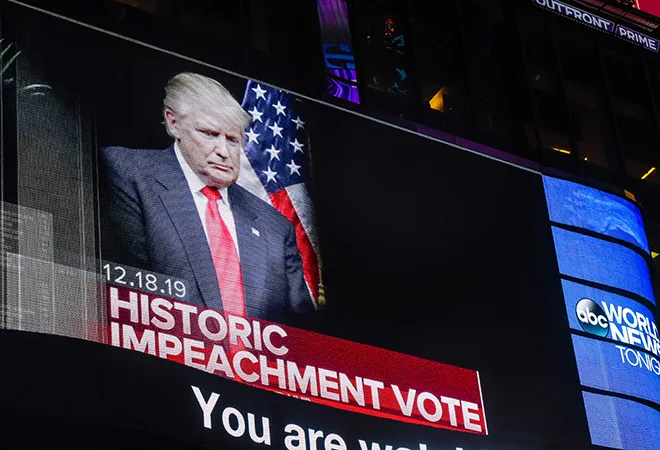-
CENTRES
Progammes & Centres
Location
American society and polity remains as polarised as three years back when Trump was elected. If anything, the polarisation seems to have only increased.

In an embarrassment for the US President Donald Trump, he has become the third President in US history, after Andrew Johnson and Bill Clinton, to have been impeached by the US House of Representatives. Trump was charged by the House of abusing the power of his office for domestic political advantage and subsequently obstructing Congress’ abilities to hold him accountable. Though it was expected, its political symbolism cannot be underestimated. It clearly draws the battle lines for the next year when the fate of US Presidency would be decided for the 2020 Presidential elections. Now the scene shifts to the Senate which will ultimately decide whether or not Trump remains in office. It’s a political battle being fought in the garb of an impeachment process. Trump knows it, his Democratic opponents know it and both seem to be playing to the gallery. The outcome is known that Trump would remain in office. Yet the sterile procedure in the US Congress is meant to signal to their respective bases that the two are serious about putting up a fight.
Even as the process was going on the House, Trump was addressing a rally in Michigan, a battleground state in elections, telling the crowd:
“While we're creating jobs and fighting for Michigan, the radical left in Congress is consumed with envy and hatred and rage, you see what's going on.”
That he would be exonerated by the Senate in a trial is obvious; what it will do to the US body politic is less clear. Earlier this week, Trump wrote a public letter to the House Democratic Speaker Nancy Pelosi accusing her of “violating your oaths of office” and “declaring open war” on American democracy. He wrote:
“Your spiteful actions display unfettered contempt for America’s founding and your egregious conduct threatens to destroy that which our Founders pledged their very lives to build.”
A hyper partisan impeachment process is likely to further polarise an already polarised American polity where the middle ground seems to have completely disappeared. The Republicans have a majority in the Senate which will ensure President Trump’s survival in office as his party members have fallen completely behind him. A two-thirds majority of senators would be required to remove Trump from office but given the majority that Republicans enjoy in the Senate, the outcome is no brainer. Republican Senate Leader Mitch McConnell has made it clear that Republican senators would act in “total co-ordination” with the president's team during the trial, overturning the very logic of Senate being an impartial trial chamber.
Even in the House, this division was clear. The House Democrats talked about the impeachment move as a historical move with House Democratic Speaker Nancy Pelosi arguing that “if we do not act now, we would be derelict in our duty” and that “the president's reckless actions make impeachment necessary.” The Republicans in the House accused Democrats of conducting an unfair and illegitimate inquiry. As Doug Collins, the top Republican on the House Judiciary Committee, underlined: “This is an impeachment based on presumption. This is a poll-tested impeachment about what actually sells to the American people.”
The entire impeachment drama has hardly made a dent in the opinion of Americans about the President which as remains as divided as ever. Because there is no middle ground left in American polity, both sides have been catering to their base. The Democratic base has been asking for an impeachment for years now and Pelosi had no option but to give in even though she initially resisted, recognising the political challenges the process would throw up. The Republicans are hoping after this process gets underway, their base would rally around an embattled President and make it easier for him to crisis the winning line in November 2020 elections. For Trump’s supporters, this impeachment is a continuation of a three-year-long witch hunt designed to oust him, a move designed to take away the mandate from a democratically elected government.
American society and polity remains as polarised as three years back when Trump was elected. If anything, the polarisation seems to have only increased. It was this polarisation that made Trump’s Presidency possible, so he has no incentive to ameliorate this situation. But even the Democrats have been trying to play along and in the process have not been able to offer any real alternative. One just has to look at the Democratic primary candidates to understand the severity of the challenge facing the party. In order to win November 2020 elections, the Democrats will have to win back the disaffected voters who crossed over to the Republican side in 2016 with as many as nine million people who backed Barack Obama also voted for Trump. In the swing states of American heartland like Pennsylvania, Michigan and Wisconsin, impeachment of Trump will not get the voters back to the Democrats. And the more Democrats focus on Trump, the less they will talk about the bread and butter issues of the working class in these states. Trump will be emboldened even further. No wonder even as the impeachment process was going on in the House, he was in Michigan, telling his constituents that “it doesn’t really feel like we’re being impeached.”
The views expressed above belong to the author(s). ORF research and analyses now available on Telegram! Click here to access our curated content — blogs, longforms and interviews.

Professor Harsh V. Pant is Vice President – Studies and Foreign Policy at Observer Research Foundation, New Delhi. He is a Professor of International Relations ...
Read More +